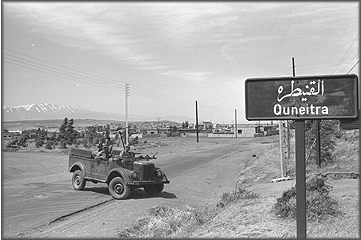UPDATES
Declassified documents from ’67 show Israel’s willingness to trade land for peace
Jun 22, 2012 | Ahron Shapiro

Did Israel’s government covet the land it captured as part of the defensive war of June 1967, which ended with Israeli forces in control of the Sinai Peninsula, Golan Heights, West Bank and Gaza?
For the most part, not at all, according to 200 pages of newly declassified transcripts from cabinet and committee meetings in the days following the war, released by Israel’s National Archive this month.
The documents, a boon for Israeli historians, end speculation over where the various factions of the broad National Unity Government of that time stood over the fate of the captured territories, and offers irrefutable evidence that Israel exited the Six Day War eager to trade land for peace.
The context for the discussions is important.
Israeli historian and former Chief Archivist of the Yad Vashem Holocaust museum Yaacov Lozowick wrote in his blog:
The immediate context: There were intense post-war diplomatic maneuvers going on at the United Nations. Abba Eban, Israel’s Foreign Minister, needed orders. The deliberations in Jerusalem were not intended as a fundamental policy statement, but rather as a hurried set of directives to Eban. Many of the ministers feared that showing cards or appearing conciliatory would harm Israel’s ability to negotiate. Although their deliberations were classified as Top Secret, any number of times they stopped short and refused to say how far they might be willing to go, for fear their positions might leak. (They seem mostly not to have, which is what makes the document so interesting).
The broader context: The ministers had spent the previous five weeks under intense pressure, frantic preparations for war, even more frantic attempts to stave it off by diplomatic means, and – crucial for understanding the present document – the collapse of the internationally sanctioned framework for Israeli-Egyptian co-existence put in place in 1956 when Israel had been forced hurriedly out of the Sinai. Then there had been the week of war itself. Rather than suffering destruction Israel had won an astonishing victory. Yet the ministers seem to have expected the great powers to re-apply the pressure of 1956. The BBC, as they repeatedly mentioned, had already begun to report about harsh Israeli measures in Jerusalem’s Old City, and they expected growing international impatience. Most of them thought Israel’s forces would be back behind the previous lines within two months.
Among the diverse members of the cabinet, a consensus on some issues formed. Israel would signal a willingness to return the Sinai Peninsula and Golan Heights to Egypt and Syria in return for, ideally, a peace treaty, or alternatively, at least security guarantees. Interestingly, even future Prime Minister Menachem Begin, generally thought to be opposed to territorial compromise before agreeing to return the Sinai to Egypt in 1977, was on board with this consensus.
Furthermore, the cabinet was resolute that east Jerusalem would not be returned to Jordan.
The cabinet viewed the West Bank and Gaza differently than the Golan or the Sinai. As Lozowick notes:
Israel’s entire Cabinet in 1967 agreed that Egypt and Jordan had no more claim to Gaza and the West Bank than Israel did, as all three had conquered them through war; since Israel was now in possession it had superior claim. There were serious disagreements, however, as to what that meant.
A consensus formed around the Gaza Strip, which most cabinet members, perhaps surprisingly, wanted to keep.
However on the matter of the West Bank, there was less unanimity. Views ranged from complete annexation to complete abdication (with the exception of Jerusalem) with most somewhere in the middle, though there was a majority belief that Israel needed to have a military presence in the Jordan Valley. Only Begin advocated attempting to keep all of it. There was also concern about returning the West Bank to Jordan for fear that King Hussein would not be able to hold on to power there (he did of course) – and some even suggested that the local Arabs be given independence, a precursor of the two-state solution idea now popular, but then not on the international radar.
By the end of the two-day discussions, the government had agreed upon a proposal to present to Egypt and Syria via international interlocutors. The archivists noted that the answer would only come later in the year and would not be what Israel had been hoping to hear.
“Israel proposes the conclusion of peace treaties with Egypt [and Syria] on the basis of the international frontiers and Israel’s security needs”. Details of Israel’s demands from Egypt and Syria also appeared.
The government decision was passed on to the US in secret. A positive answer was not received from either Egypt or Syria. On 2 September 1967 the Arab leaders meeting in Khartoum reached a decision known as the “three nos”: no peace with Israel, no recognition of Israel, no negotiations with it.
While the bulk of the released documents are only available in Hebrew, five pages worth of material, representing a distillation of the key passages of the transcript, have been translated into English.
[It may be worthwhile to compare notes from the cabinet and committee meetings to Eban’s UN speech as delivered on June 19, 1967. That speech is available online in audio form as well as in printable format.]
Ahron Shapiro
Tags: Egypt











